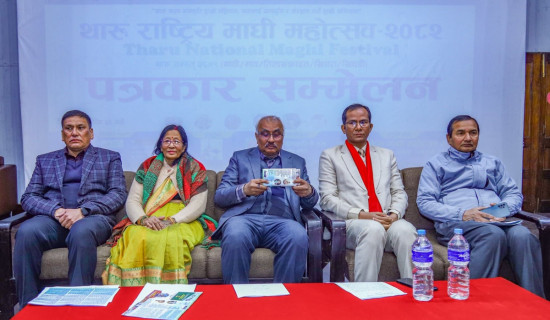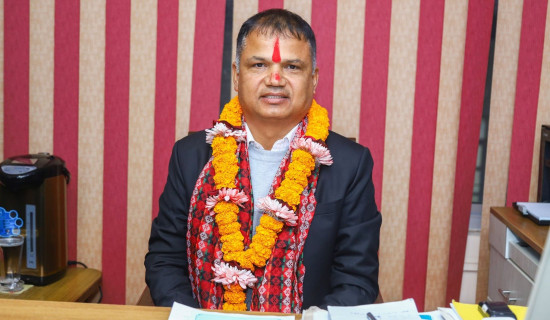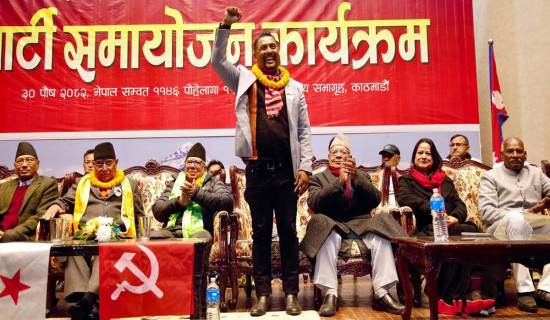- Wednesday, 14 January 2026
Use Social Media Responsibly
A socio-political sensation has recently arisen in Nepal with the government's decision to ban TikTok, one of the most popular social media. A wealth of arguments has surfaced for and against this social media and its ban. It could be natural to speak against the ban for the youths so fond of it, but the same incident has become a bone of contention among middle-aged people, or even among the aged. More astonishingly, the political leaders of different parties, including those that belong to the ruling coalition, have been heard speaking vehemently against the decision to ban it. A grave question comes to critical minds – can it be a wise decision to uproot a tree that yields delicious fruit that attracts many people despite its absence of nutrition? By the same token, another question can be raised: is it a wise decision to ban social media that attracts many people for recreation, although some of whom may have misused it?
We may sometimes ponder over the unforeseeable consequences of scientific discoveries that have brought more harm than a boon to humanity. In nostalgic moments, we might think we would be happier without those harmful scientific discoveries that have devastated the world in the twinkling of an eye. Some people, mostly orthodox ones, even go as far as to curse those scientific discoveries, which otherwise would be beneficial if handled considerately. These nostalgic feelings are not baseless, however. There can be adequate evidence to prove the point.
Scientific Discoveries
We have been living with the boons technology that has brought about in our times. Life has become more comfortable and easier. The discovery of modern medicine has lengthened human life, but the same may create the menace of overpopulation. Likewise, the invention of nuclear energy has made human life better and easier, but the same can bring about catastrophe with the development of nuclear weapons. We should not forget so soon – the Japanese inhabitants probably can never – the worst devastating scenes in big cities economically so prosperous and culturally so rich. Still, the question remains hanging in the human sky – was it bad to invent a scientific idea that would entirely change the face of society if used properly?
Scientists claim that science is based on facts and very close to nature whether we know it or not, whether we can use it or not. They argue that the use or misuse of a discovery that would otherwise be beneficial to the whole of mankind is more an ethical issue than one that demands truth or untruth. Many things on this earth have two sides – beautiful and unbeautiful, useful and useless, long-lived and ephemeral. Cow dung, for instance, is ugly, but it is a valuable thing to make manure for the farmers to grow crops. In this respect, we can argue that scientific discoveries are ethically neutral – so should scientists who are involved in invention and discoveries. But we should understand that any technological discovery comes with both bright and dark sides simultaneously. We need to distinguish between the natural process and human action. The natural process is factual and normal, human action is value-based and judgemental.
TikTok, like any other form of social media, is a social product manufactured by human scientists who eat their meals and drink water from the common earth we all share. When they developed this media, they certainly did not think that it might as well bring undesirable byproducts. To control the unwanted consequences is not the task of the scientist who developed it. Instead, this is the task of politicians and social activists who are responsible for convincing the general people about its use and abuse. They are the actors responsible for making and unmaking the civilisation and culture that would best suit the context of the situation without allowing society to derail from the right track.
Nepal government's recent decision to ban TikTok may be right or wrong on its end, but it is controversial. There are two schools of thought corresponding to the two sides of the argument – those who are in support of the ban and those who are against it. The former group argues that TikTok has derailed the youths from their life track, which misleads society as a whole. They also argue that it has brought social evils that might in turn spoil civilisation and culture. The latter group counter-argues that banning something considering its misuse without penalising the abusers would not simply be a wrong idea but a stupid one.
Responsibility
A form of social media that has played a very significant role in engaging people in entertainment at their leisure cannot be discredited for a transient cause. Both arguments are valid in their own rights, so neither of them is to blame. The responsibility of the government should be to consider the case critically and reach a wise conclusion in consultation with relevant experts. TikTok is not the only means of social media in use. If TikTik has brought unwanted consequences, so can other means of social media such as Facebook, X (Twitter), Messenger, Viber, and WhatsApp. Our problem is not with a particular form of media itself but with social psychology and behaviour.
Unless the whole society raises its ethical standards to a higher level, individual citizens cannot be wise enough to decide which things they should do and which they shouldn't on TikTok or any other form of social media. This does not mean, however, that nothing should be banned by the government. If something is overtly harmful to the individual and society, it should undoubtedly be banned for the public good. The government also should make decent decisions that are practicable. They should adequately investigate the case before they decide and publish the necessary guidelines. Once they decide, they should stick to the decisions and implement them to the best possible effect. This enhances the government’s credibility and society goes forward in the right direction.
(The author is the chairman of Molung Foundation. bhupadhamala@gmail.com.)
















